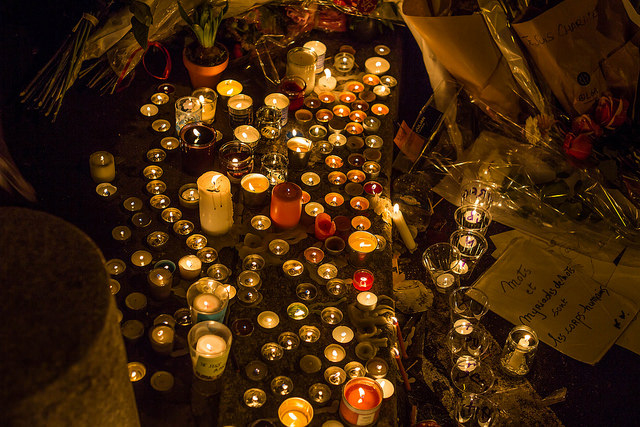
The recent attack on the headquarters of the satirical French magazine Charlie Hebdo was devastating, underscoring violent times under the treacherous shadow of terrorism. We must take care not to lace our grief with hate, vengeance and more violence by misconstruing our racism as our democracy.
Simply put: Political cartoons are free speech, but they are not always innocent and inherently democratic. Although Charlie Hebdo’s satirical cartoons are directed at a broad swath of people and political issues, we cannot dismiss the historical relationship between racist caricature and racist violence. To do that, I dare say, would be to undermine the very spirit of healthy debate and controversy Charlie Hebdo upholds.
Indeed, this attack is a painful reminder that moments like these often spiral democratic nations into racist tirades of animosity and revenge fomented by xenophobia, in this case, painting all Muslims as terrorists.
In fact, anti-Islam sentiment has been on the rise across Europe. Shortly after the attacks, conservative French politician Marine Le Pen, leader of the far-right National Front party, predictably blamed Islam for the murderous rampage. However, as the day ‘s events progressed, even the most liberal pundits allowed their grief to slip into anti-Muslim sentiment. The Washington Post decided to republish one of Charlie Hebdo’s controversial cartoons of the Prophet Mohammed.
Charlie Hebdo is a controversial magazine by any assessment. Its satirical cartoons characterize its polemical nature and have poked fun at a host of religions over the years, not just Islam. Yet few have been talking about the racism of many of the magazine’s cartoons and how they provocatively push the boundaries between free speech and prejudice.
Political cartoons are clearly one of our democratic rights. They are, however, also one of the primary media of racism often employed in tense political times. Take for example a cartoon that circulated on a Democratic Party flyer during the 1866 Pennsylvania congressional and gubernatorial campaign in the United States. The19th century cartoon was used as propaganda against The Freedman’s Bureau, a policy aspect of Reconstruction designed to integrate African Americans into mainstream society after legal abolition.
As social media took up the hashtag #JeSuisCharlie in solidarity with Charlie Hebdo, a smaller voice of grief and dissent also emerged: #JeNeSuisPasCharlie – a hashtag that acknowledged the senselessness of the violence involved with the case but also refused to dismiss the history of the magazine ‘s racism.
Many of Charlie Hebdo’s most controversial cartoons have not only been directed against Muslims. They have also been directed against black people, particularly women, like the Nigerian girls abducted by Boko Haram. We can condemn the violence against Charlie Hebdo without condoning the racism they often reproduce.
Cultural studies scholar Stuart Hall reminds us that images and caricature have a long, intertwined relationship with colonialism, slavery and prejudice across the Atlantic world. All caricature is not created equal. Some of it, when mobilized alongside legacies of race, gender, sexuality, class and yes, even religious discrimination, can reproduce uneven power dynamics that have a negative effects on marginalized people. The racist cartoons of African Americans that circulated widely in the United States in the 19th century were by many accounts a precursor for lynching. See, for example, Marlon Rigg ‘s documentary Ethnic Notions.
In 2013, the editor of Stéphane Charbonnier, affectionately known as “Charb,” who was killed in the attack, wrote a brief essay defending the weekly against accusations of racism,
“Charlie, our Charlie Hebdo, is feeling decidedly ill. Because an unbelievable lie is going around, among more and more people, and we hear it every day. According to them, Charlie Hebdo has become a racist sheet.”
He goes on to note that “antiracism and a passion for equality among all people are and continue to be the founding principles of Charlie Hebdo. “
But that is just it. The conversation was not over. By killing Charb and the other nine journalists at Charlie Hebdo, the assassins truncated our ability to continue the debate. That is where the tragedy lies, not in the extent to which we should be free to produce any kind of racist cartoon we like without thinking about the political and emotional impact it might have.
We had more to debate, more to discuss, and Charb should be here to answer.
5 Days Left: All gifts to Truthout now matched!
From now until the end of the year, all donations to Truthout will be matched dollar for dollar up to $50,000! Thanks to a generous supporter, your one-time gift today will be matched immediately. As well, your monthly donation will be matched for the whole first year, doubling your impact.
We have just 5 days left to raise $50,000 and receive the full match.
This matching gift comes at a critical time. As Trump attempts to silence dissenting voices and oppositional nonprofits, reader support is our best defense against the right-wing agenda.
Help Truthout confront Trump’s fascism in 2026, and have your donation matched now!